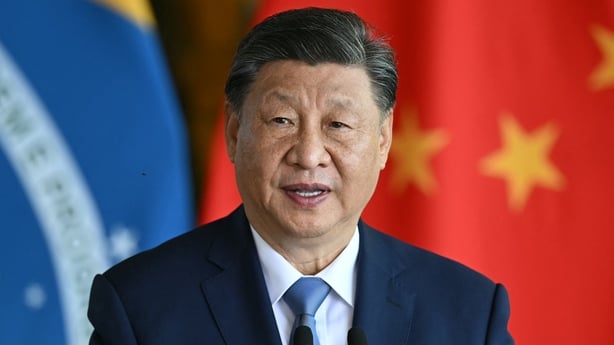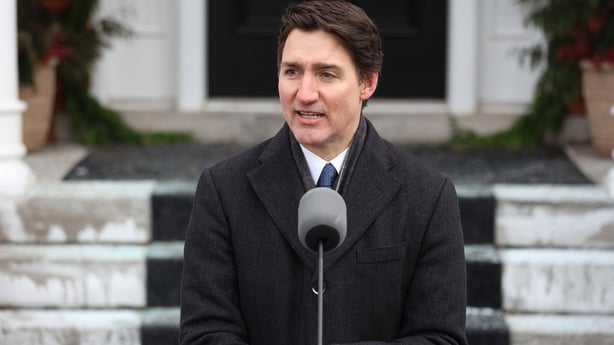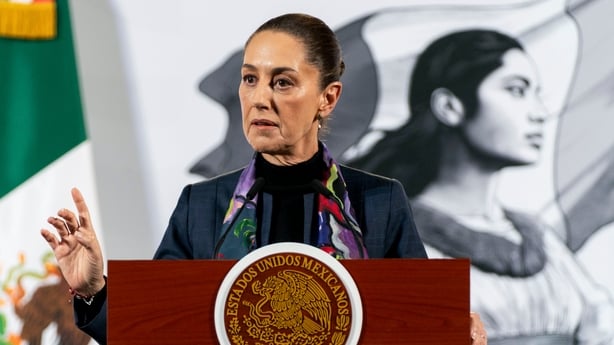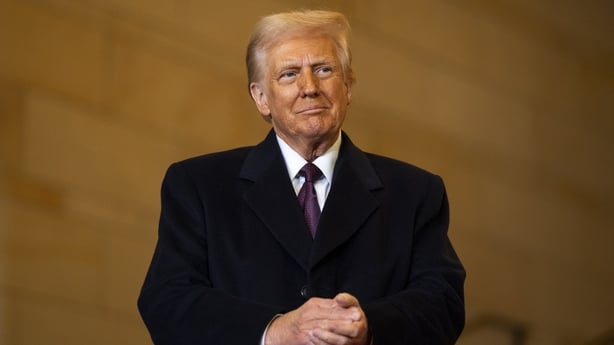US tariffs of 10% on Chinese imports came into effect today, risking a renewed trade war between the world's top two economies as President Donald Trump punishes China for not halting the flow of illicit drugs.
Mr Trump suspended his threat of 25% tariffs on Mexico and Canada at the last minute, agreeing to a 30-day pause in return for concessions on border and crime enforcement with the two neighbouring countries.
But there was no such reprieve for China, with new levies coming into effect at 12.01am today (5.01am Irish time).
A White House spokesperson said Mr Trump would not be speaking with Chinese President Xi Jinping until later in the week.

During his first term in 2018, Mr Trump initiated a brutal two-year trade war with China over its massive US trade surplus, with tit-for-tat tariffs on hundreds of billions of dollars worth of goods upending global supply chains and damaging the world economy.
To end that trade war, China agreed in 2020 to spend an extra $200 billion a year on US goods but the plan was derailed by the COVID pandemic and its annual trade deficit had widened to $361 billion, according to Chinese customs data released last month.
"The trade war is in the early stages so the likelihood of further tariffs is high," Oxford Economics said in a note as it downgraded its China economic growth forecast.
Mr Trump warned he might increase tariffs on China further unless China stemmed the flow of fentanyl, a deadly opioid, into the United States.
"China hopefully is going to stop sending us fentanyl, and if they're not, the tariffs are going to go substantially higher," he said.
China has called fentanyl America's problem and said it would challenge the tariffs at the World Trade Organisation and take other countermeasures, but also left the door open for talks.
Neighbourly deals

There was relief in Canada and Mexico, as well as global financial markets, after the deals to avert the hefty tariffs.
Both Canadian Prime Minister Justin Trudeau and Mexican President Claudia Sheinbaum said they had agreed to bolster border enforcement efforts in response to Mr Trump's demand to crack down on immigration and drug smuggling. That would pause 25% tariffs due to take effect today for 30 days.
Canada agreed to deploy new technology and personnel along its border with the United States and launch cooperative efforts to fight organised crime, fentanyl smuggling and money laundering.
Mexico agreed to reinforce its northern border with 10,000 National Guard members to stem the flow of illegal migration and drugs.
The United States also made a commitment to prevent trafficking of high-powered weapons to Mexico, Ms Sheinbaum said.

"As President, it is my responsibility to ensure the safety of ALL Americans, and I am doing just that. I am very pleased with this initial outcome," Mr Trump said on social media.
After speaking by phone with both leaders, Mr Trump said he would try to negotiate economic agreements over the coming month with the two largest US trading partners, whose economies have become tightly intertwined with the United States since a landmark free-trade deal was struck in the 1990s.
The latest twist in the saga sent the Canadian dollar soaring after slumping to its lowest in more than two decades. The news also gave US stock index futures a lift after a day of losses on Wall Street, and sent oil prices lower.
Industry groups, fearful of disrupted supply chains, welcomed the pause.
"That's very encouraging news," said Chris Davison, who heads a trade group of Canadian canola producers. "We have a highly integrated industry that benefits both countries."
Mr Trump suggested the 27-nation European Union would be his next target, but did not say when.
EU leaders at an informal summit in Brussels yesterday said Europe would be prepared to fight back if the US imposes tariffs, but also called for reason and negotiation. The US is the EU's largest trade and investment partner.

Mr Trump hinted that the UK, which left the EU in 2020, might be spared tariffs.
Mr Trump acknowledged over the weekend that his tariffs could cause some short-term pain for US consumers, but says they are needed to curb immigration and narcotics trafficking and spur domestic industries.
The tariffs as originally planned would cover almost half of all US imports and would require the United States to more than double its own manufacturing output to cover the gap - an unfeasible task in the near term, ING analysts wrote.
Other analysts said the tariffs could throw Canada and Mexico into recession and trigger "stagflation" - high inflation, stagnant growth and elevated unemployment - at home.
China hits back with tariffs on US goods
China slapped tariffs on US imports in a rapid response to new US duties on Chinese goods, renewing a trade war between the world's top two economies.
Within minutes, China's Finance Ministry said it would impose levies of 15% for US coal and LNG and 10% for crude oil, farm equipment and some autos. The new tariffs on US exports will start on 10 February, the ministry said.
Separately, China's Commerce Ministry and its Customs Administration said the country is imposing export controls on tungsten, tellurium, ruthenium, molybdenum and ruthenium-related items to "safeguard national security interests".

